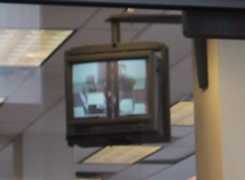I’ve written in this space before about the Formosa Tea House (2001, 2002).
And now they’ve gotten bigger.
Fueled by space abandoned by The Reading Well after its flight east to Water Street, the Formosa Tea House on University Avenue has busted through the back wall and opened up a very nice, bright space with five additional tables.
I’m constantly amazed by the blind spot my contemporaries have for that stretch of University Avenue between Kent and FItzroy that the Formosa Tea House calls home. It is, admitedly, not the prettiest part of our city. But in the decade we’ve been here it has gotten much better. Somehow decades of neglect means that many Islanders appear to simply look straight ahead when driving up University, and so when I try to describe to them where the Tea House is, they get a deep and profound blank look on their faces.
So here is a detailed set of directions: go to the corner of Kent and University (translation to diehard Islanders: “go to the corner of Kent and Great George”). Stand in front of where Sam the Record Man and CFCY used to be. Walk out University towards the outskirts of town. You will pass Comic Hunter, an antique shop, Fergie’s Barbershop, the Taj Mahal restaurant and the space formerly occupied by The Reading Well. Stop. You are now at the entrance to the Formosa Tea House. There is a small porch with pine trim and astroturf carpeting at the entrance.
The hours of operation are 11:00 a.m. to 5:00 p.m. Monday through Saturday. Go earlier in the day rather than later, as they are a small operation, and tend to run out of many things after two or three in the afternoon. You do not need a lot of money (I rarely spend more than four dollars for a tea and snacks). You do not need to know anything about tea. There is no chanting (unless you want to chant). You can even order a cup of coffee or a hot chocolate.
My personal favourites are Lemon Iced Tea, the spicy stuffed buns, and the bamboo rice. They have good fresh-squeezed orange juice. And, of course, tea.
The owners are very nice. You can bring children. If you go alone, they have a nice selection of books, newspapers and magazines to read, located right beside the front door. You will never feel pressured to leave.
I await reports from the tea-virgin readership.
After stripping this space bare aesthetically, I’m starting to get a hunger for some of the old clutter. So to the right you will now see three new lists: a list of new items since your last visit, a list of new discussion since your last visit, and a list of audio and video items that have appeared here.
Your “last visit” is calculated from a cookie you get sent every time you visit, called, appropriately enough, ReinventedLastVisit.
Enjoy.
When I started volunteering at Trent Radio, early in my year at university, I met two guys, Richard Hamilton and Ken Hone. At the time I was an empty political vessel waiting to be filled up, and Rick and Kenny happily facilitated this. They were a couple of the rabble-rousers behind a storefront political group called “Projects for Change.”
Projects for Change was many things: a food bank, a lending library, a place to print leaflets, a place to drink beer. It had a revolving membership of university students, radicals (real and aspiring). The issues we concerned ourselves with ranged from poverty to nuclear power to the arms race.
Although I don’t think I ever made it to bona fide radical status — I always felt like an interloper — I loved the place nonetheless, and was involved, to one degree or another, for four or five years. I still have the old Projects for Change sign, hand-painted by Kenny, hanging on my wall.
Towards the end of my time in Peterborough, I partnered with Oonagh O’Connor to produce a radio documentary called “The Emotions of Activism.” Our goal was to interview a series of people involved in activist politics, but rather than interviewing them about their cause, we talked to them about the underlying rationale for their orneriness, the emotions behind their activism rather than the thoughts. What, in the gut, gets people up and out on the barricades, or behind the printing press or on the radio.
Although I have lost the tape of the final product, I do have the original, unedited interview tapes. An interview with Kenny is among them. Setting aside my rambling interviewing technique (this was before I got the Ann Thurlow brevity religion), the interview is a great listen, due entirely to Kenny’s clear-minded ability to get at the stuff of what drives him. It’s also an excellent short course in how to be a good human being.
The interview was recorded on an inexpensive tape recorder, using one of the classic Radio Shack PZM microphones that, to my ear, make excellent mics for doing interviews like this because they produce bright sound and lots of atmospherics (some of this has been drummed out by the digitizing down to 32K; the silences appear too silent, but it makes for a smaller file).
Although I gave myself over to the Camper religion last fall, I still have a soft spot in my heart for Simple shoes. They unveiled a new website today and that’s a Good Thing because their old website was more like a television commercial than a website.
Simple has realized that the role of a website is to tell people about their products, not to sell them on the lifestyle that they want to tie their products to. The new site is, err, simple, quick to load, and makes it easy to buy their shoes.
My favourite sentence on the site is in the description for their Deco Thong: “Masculine thong available in earthy leathers.” I don’t know what that means, but it sounds awfully alluring.
Back in the early 1990s, I was Programme Director at Trent Radio, a campus-community radio station in Peterborough, Ontario. At the time, the station had a broadcast audio line running from Artspace, an artist-run centre downtown; this meant we could do live broadcasts of anything happening in Artspace’s performance hall.
On June 1, 1990, we organized an event called RadioMusic, and invited a wide variety of performers from the community to come and play for two audiences: people in the bleachers, and people listening in on their radios at home.
John Muir did the sound, and Ron Gaskin was up in the studio acting as a virtual host and technical man.
One of the highlights of the evening was a 25 minute set by Curtis Driedger.
Criticized once by my father as “having a total absence of musicality,” Curtis has always been one of my favourite performers. From the presciently-named 1980s band the CeeDees to the various and wonderful musical projects he’s done since, Curtis is (my father’s protests notwithstanding) a great musician, and an insightful songwriter. He’s also a really nice guy.
I was going through my archives the other day, and found a tape of Curtis’ set from that night, 13 years ago.
For obvious reasons it’s in my best interests, personally and corporately, to offer little or no comment in this space about matters directly relating to matters of Island politics.
What I wonder is: how come nobody else does?
For a place where politics seems to infuse everything from the flowers to the trees, where are Islanders writing online about things Island and political?
Otherwise known as “Norman’s,” Brighton Clover Farm is a small, well-stocked grocery store tucked in the Brighton, the patrician residential area of Charlottetown.
My patrician friends have been waxing eloquent about Norman’s for as long as I can remember, but until Sunday I’d never done anything more than purchase a Globe and Mail there.
On Sunday, in preparation for Catherine Hennessey’s “Grocery Crisis Downtown” meeting (Coles Building, 7:00 p.m. on Thursday, March 6, everyone welcome), Don the Dentist, Catherine and I took a short tour of the grocery stores downtown, and one of our stops was Norman’s.
The most important thing to know about the place is that they sell six varieties of Montreal bagels, direct from the Fairmont Bagel. This fact immediately sets them ahead of any grocery store on the Island. Add to this a decent selection of Haagen Dazs and Ben & Jerry’s ice cream, a credible assortment of Lebanese ingredients (including an good assortment of olive oils, always important in our slightly eponymous family), fresh produce, a meat counter, Lebanese coffee, magazines, video rentals, and an assortment of useful things like confetti, can openers, playing cards and shampoo, and I can’t see a reason for shopping anywhere else.
Norman himself is a very nice man, in my limited experience. Makes shopping at the “Super” Store feel all icky and impersonal.
Only downside: it’s just far enough out of our neighbourhood to be too far to walk, especially in the frigid cold we’ve had here recently.
|
CBC Television, Province House |
|
The IslandCam, Province House |
|
Bank of Nova Scotia ATM |
|
Bank of Nova Scotia Front Foyer |
|
Family Shoe Store |
|
Cotton Ginny |
|
Taylor’s Jewellers |
|
TD Bank |
|
The Bookman |
|
Charlottetown City Hall |
|
Atlantic Technology Centre |
|
Fitzroy St. Parkade |
The latest debacle to ooze from the CBC is something called CBC Home Delivery, which uses technology from BackWeb to push audio and video content to Windows desktops in the background.
Setting aside that this is a web metaphor that others explored and abandoned several Internet eons ago, the project represents another instance where the CBC is determined to showcase the “new” in “new media.” And so rather than presenting text, audio and video content in an open, standards-based way that would allow the content to “participate in the web,” it’s all hidden behind multimedia-drenched locked doors.
Go to this page for example. After you skip over the masturbatory opening sequence, you’ll see several paragraphs of text explaining the new project. Try and copy and paste this text. You can’t. Because it’s not really text, it’s a Flash presentation. Yes it’s hot and sexy and a gyrational. But say you’re blind and want the text read to you by your computer: no dice. Or say you want to quote from the text. Or link to it. Nope.
What’s the rationale for this? This page says:
Home Delivery is finally here and offering you a way to cut through the overflow of information out there and take media to a new level. It’s taking storytelling to a whole new level by offering smart, rich content - no waiting, no downloading, and no searching.
Even if you ignore the separatist approach to technology the project embodies, I have to question who exactly the market for “news as Depeche Mode videos” crossed with “news as slideshow-enhanced radio clips” is. The multimedia layer adds nothing to the content. Short of employing a gaggle of Flash designers and programmers, I can’t see why the CBC would bother heading in this direction. Where are they getting their advice? Who is it that’s telling them that the accidents that are CBC Radio Three and ArtsCanada are something we need more?
This is not to say that the CBC isn’t doing some good things with “new media.”
The “View Traffic Now” feature of the CBC Toronto Metro Morning program is an excellent use of multimedia to make a complex set of information clear, concise and easy to access (I’d link right to it, but alas I can’t do that either: go to the main Metro Morning page and click on the “View Traffic Now” link on the left-hand side of the page).
The science show Quirks & Quarks has streaming audio of all of their programmes available in a variety of formats (which a pleasant departure from the CBC’s tendency to use RealAudio, which is slow, unreliable and often over-subscribed).
These examples use multimedia where it’s useful, rather than as a sort of virtual mayonaise to slather over content to make the young ones think it’s not their father’s CBC.
Stop the insanity.












 I am
I am